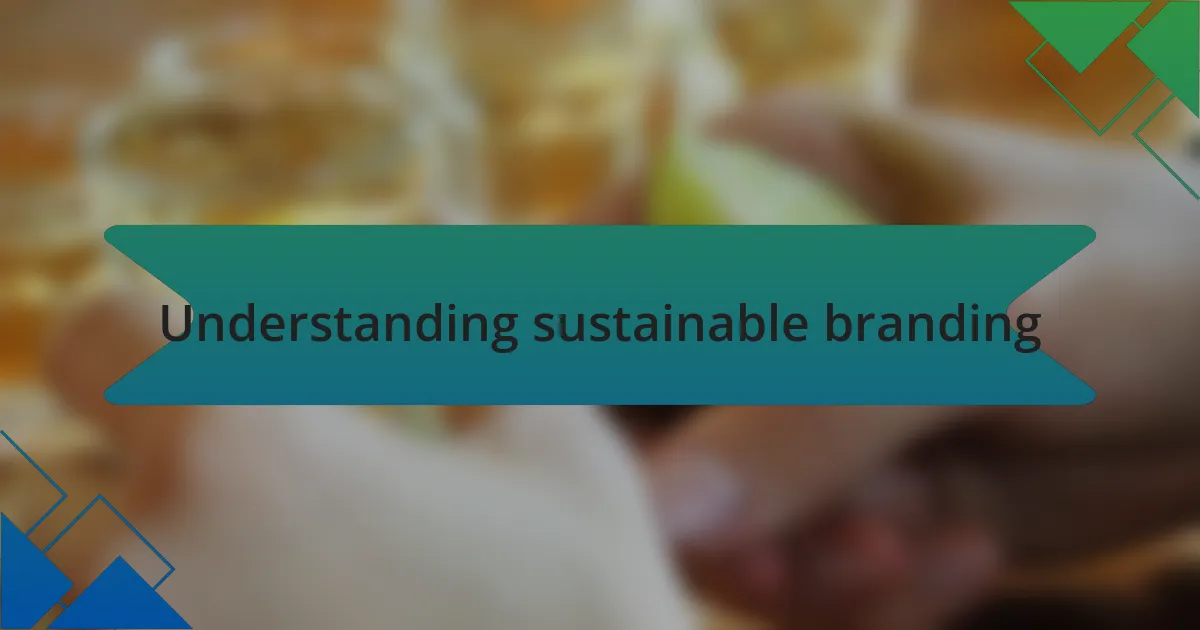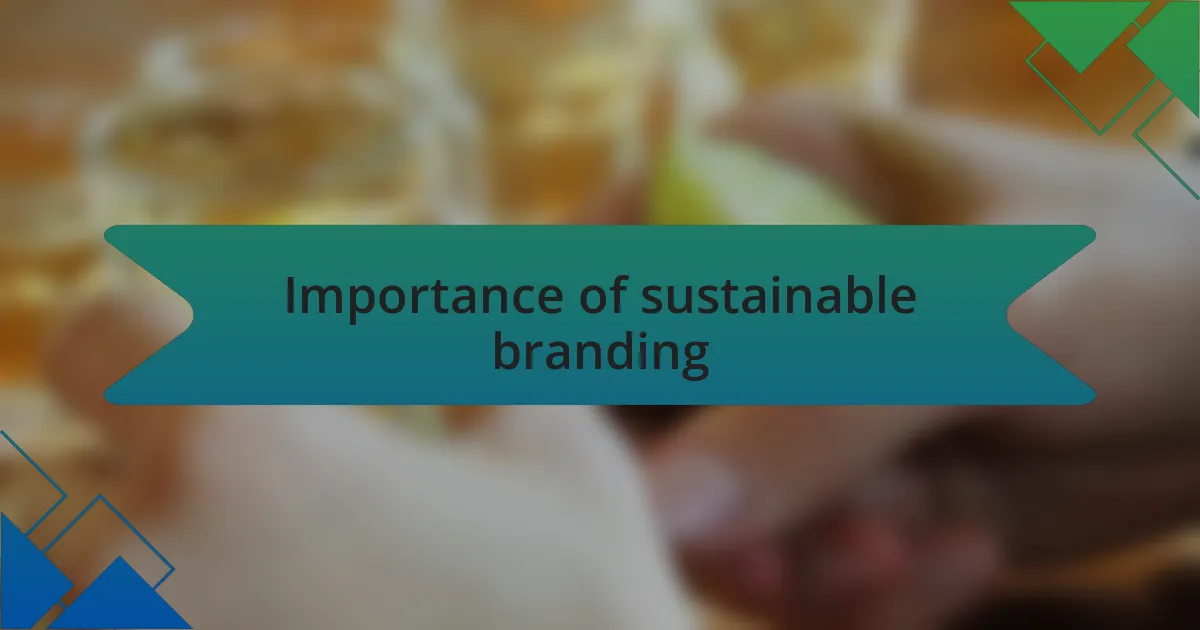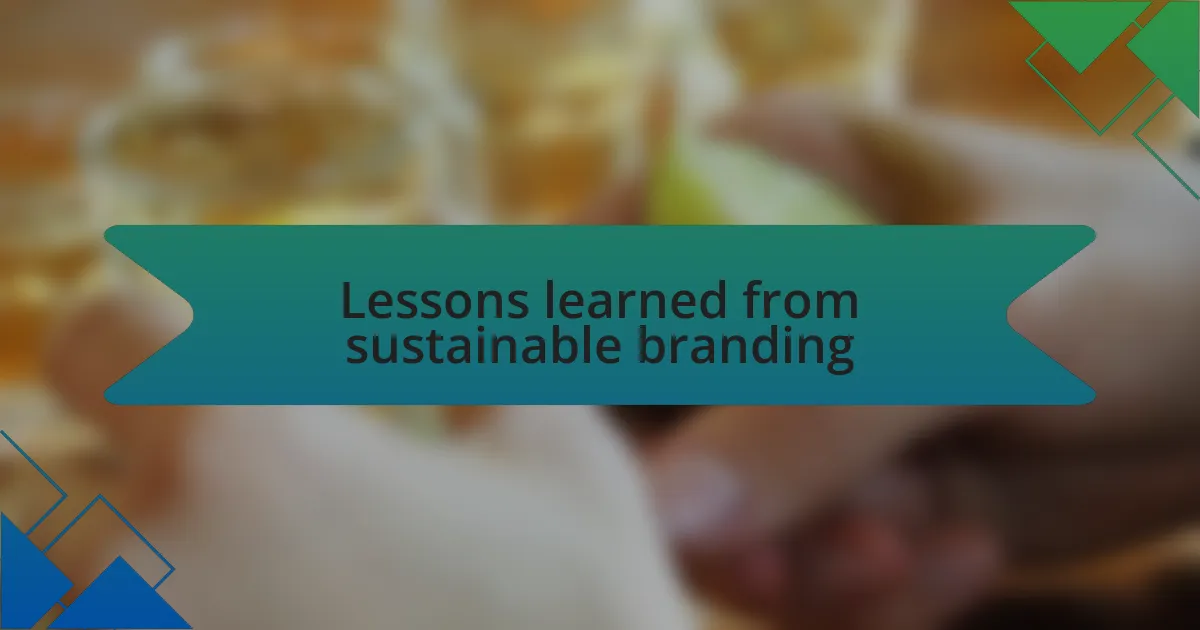Key takeaways:
- Sustainable branding is about aligning ethical practices and social responsibility with consumer desires for transparency and authenticity.
- Brands that embed sustainability into their core values tend to foster consumer loyalty and are better positioned for long-term success.
- Effective marketing strategies include transparency in sourcing, community partnerships, and sustainable packaging to enhance brand perception.
- Authenticity and consumer engagement in sustainability initiatives can differentiate brands in a competitive market.

Understanding sustainable branding
Sustainable branding goes beyond just eco-friendly packaging; it embodies a company’s commitment to ethical practices and social responsibility. I remember the excitement I felt when I discovered a gin brand that not only sourced local botanicals but also supported sustainable farming initiatives. How refreshing is it to see a brand align its values with its actions?
At its core, sustainable branding taps into the growing consumer desire for transparency and authenticity. It made me reflect on my own purchasing decisions; I often find myself drawn to brands that tell a compelling story about their environmental impact. When a product isn’t just a product but represents a movement, it elevates the entire experience.
Think about it: how often do we engage with brands that foster a sense of community and shared beliefs? I cherish brands that encourage responsible consumption, and sustainable branding is their voice. It’s a powerful reminder that we are not just buying a product; we are investing in a better future together.

Importance of sustainable branding
Sustainable branding is crucial in today’s market because it reflects a brand’s true character and mission. When I stumbled upon a gin distillery that not only prioritized eco-friendly processes but also actively engaged with its local community, I felt a deeper connection with the product. It sparks the question: how can we trust brands that don’t walk the talk?
Moreover, sustainable branding fosters loyalty among consumers who increasingly value ethical consumption. I remember choosing a gin that supports fair trade practices, not just for its taste but because I resonated with its commitment to social justice. This choice wasn’t just about enjoying a good drink; it was about being part of a larger purpose.
The importance of sustainable branding also lies in its resilience against market changes. Brands that embed sustainability into their core values are often better positioned for long-term success. In my view, those brands seem to thrive because they rest on a solid foundation of trust and accountability, making it easier for consumers like me to stay loyal in a crowded marketplace.

Strategies for sustainable gin marketing
When considering strategies for sustainable gin marketing, transparency is key. I recall a distillery that openly shared its sourcing practices and carbon footprint. This kind of honesty not only appealed to me but also made me wonder how many other brands hide behind vague promises.
Another effective strategy is forming partnerships with local artists and environmental organizations. I remember attending a gin tasting event where the brand collaborated with a local artist to create limited-edition labels inspired by nature. It was refreshing to see a brand actively investing in its local culture while also promoting sustainability. Wouldn’t you agree that connecting with community can create a more meaningful brand experience?
Lastly, incorporating sustainable packaging can significantly impact consumer perception. I recently purchased gin in a bottle made from recycled materials, and it felt good to know that my choice was environmentally friendly. It raised a question for me: how much do we consider packaging when we choose a product? For me, this choice not only enhanced my drinking experience but also reinforced my commitment to supporting brands that make environmentally conscious decisions.

Lessons learned from sustainable branding
Sustainable branding has taught me the importance of authenticity. I remember a gin brand that started sharing stories about its eco-friendly journey through social media. It hit me how powerful genuine narratives can be; they create connections. Have you ever felt drawn to a brand because their story resonated with you?
Another lesson I learned is about the significance of consumer engagement in sustainability efforts. At one point, I participated in a community cleanup organized by a gin brand. The experience not only deepened my appreciation for the brand but also highlighted how actively involving customers can turn them into brand advocates. It made me question how often brands truly engage their customers in their initiatives.
Lastly, I’ve realized that sustainable practices can be a differentiator in a crowded market. I recall a small distillery that focused on reducing water usage in their production process while sharing impactful statistics on their website. This commitment not only enhanced their brand image but also sparked conversations among consumers. It encouraged me to think: what unique sustainable practices could set a brand apart in this competitive landscape?